Recent Blog Posts
S. Korea Takes a Step Backwards by Levying a Tax on Foreigners' Bond Holdings
The primary challenge facing South Korea is, in fact, an identity crisis of sorts. Subjugated by larger nations in the past, Korea has fought and won its war versus nationwide poverty. No longer is South Korea one of the world's poorest nations. No longer is South Korea a war-torn nation whose children had to forgo their education while escaping artillery fire. Samsung Electronics, LG Electronics, Hyundai Motors, Posco (Pohang Steel): these are globally-recognized leaders now, all originating from a country of only 50mm people with limited natural resources. The Seoul Gyopo Guide has been created to foster one central theme: Korea has deserved its place among a very few privileged nations, but its social and legal structure must match its fully-developed economy. This is the critical step necessary in order to be fully recognized by the other leaders of the free world. This is not an easy task, and will not happen overnight.
New Proposals for a Tax on Bonds is Totally Wrong and a Huge Step Backwards
When there are steps taken backwards, then they must be pointed out. Recently, the Korean parliament re-introduced the notion of a levy on fixed-income investments on KRW-denominated bonds. This is the type of knee-jerk reaction that Korea has often displayed when there is a foreign influx of capital. The very point of capital movement is the idea that money goes away from unattractive opportunities to attractive opportunities. In order to be considered a long-term investment opportunity, however, the laws should not change quickly back and forth depending upon market conditions. Prices of investments should change due to the market conditions, not laws. In fact, it is not the tax itself which is the problem. Many other nations have had similar measures in place. It is the notion that the law is subject to change on the whim of parliament due to market pressure or political opinion that is the problem.
One might counter-argue that the Bank of Korea changes its mind frequently by changing policies. The answer to this counterargument is that when the Bank of Korea changes interest rates, then that is a market price. That is the standard global practice, and the Bank of Korea is fulfilling its duties. However, when the BOK changes the rules or capital inflows, that is a different matter entirely. The Seoul Gyopo Guide has criticized the BOK when it has announced that it is considering such steps.
Korea's Changing Policies Confuse Long-Term Investors
Korea has been guilty of this practice on the international stage in the past. One of the Seoul Gyopo Guide's favorite examples was the Lone Star - KEB debacle. The Korean government approved, and then attempted to nullify a private equity's buyout of the then-paralyzed Korea Exchange Bank. One interesting point: Japan had the exact same situation when Ripplewood Holdings, a U.S. private equity firm bought the Long-Term Credit Bank of Japan, and eventually renamed it as Shinsei Bank. While the case gained a lot of attention, legal barriers were not instantly erected by the Japanese Diet (parliament) to block that takeover. Therein lies the problem: Korea's legal structure and its whimsical policies confuses long-term investors, who can be dissuaded from investing in Korea over the long haul. As a result, foreigners who are interested in investing in Korea have almost no other choice than to invest in liquid markets, where investors can change their mind rapidly.
Even at Home, Koreans Are Confused
Korea has been guilty of this practice in its own domestic market as well. It is a well-known fact in Korea that the taxation of residential real-estate has fluctuated from administration to administration, and sometimes within a single presidential administration. In fact, current thoughts are to weaken the real-estate taxation laws in Korea, because the market has been relatively weak compared to other financial assets. The lagging real estate market is a drag on consumer sentiment, and thus, consumer demand for products is lower than it would otherwise be. It is another example of how changing policies confuse investors, even Koreans residing inside Korea. It is no wonder that foreign investors are confused.
Korea Isn't Brazil, nor China
The counterargument against the Seoul Gyopo Guide's claims above could be that other "emerging" economies, like Brazil's or China's also have a similar set of ever-changing rules. While those countries do have changing rules, it is clear that foreign investors could invest even more if those nations' legal structure were more stable. In addition, Brazil and China have two natural advantages that South Korea does not enjoy, natural resources (Brazil) and an enormous population (China). Therefore, those two countries have the luxury of being able to say to the rest of the world, "Take it or leave it." Korea does not enjoy these luxuries, and as a result, the changing rules in Korea are more likely to result in the choice, "leave it." By that same token, Korea is no danger of being compared to Russia, who intentionally, selectively didn't pay foreign borrowers on its national debt. Korea isn't and shouldn't be compared to this almost-unbelievable example.
Other Aspects of Life are Affected by Korea's Legal Structure
Other, lesser known, aspects exist in which Korea does not adhere to international standards of law. For example, Korea has not adhered to the Hague Convention on Child Abduction in the past. That has only recently changed. Eighty-one other nations around the world had signed this agreement before Korea adopted it. There have been many well-publicized stories regarding this type of controversy in Korea.
Conclusions: Global In Name Only?
Perhaps the most over-used word in Korea is the word "global." Global this, global that. Its companies have produced and delivered products around the world. There is zero doubt about that, and it has occurred at breakneck speed, relatively speaking. A plot of land (a huge amount of money then) on the large Tehran-no (street name in the Gangnam district of Seoul) at the end of the Korean War in the 1950s which was worth around $10,000 would be worth no less than $300,000,000 today (with building, obviously). Its laws have not changed at the same pace: there are justifiable reasons for that. Nevertheless, the laws and the procedures need to evolve so that Korea can take even further steps to cement its position in the first world. The "developing world," or "emerging market" labels no longer fit Korea. Other countries are considering new withholding tax measures as well. However, those other countries are Indonesia and Thailand. Those two countries' economic development are not anywhere close to South Korea's. They are not valid comparisons, and yet even the influential Financial Times mentions South Korea and those two other nations in the same vein. If the laws are reliable, stable, and can be understood to be so by foreigners, then and only then will Korea be global. The recently-considered tax on foreign holdings of KRW-denominated bonds is a definite step backward towards this end.
Sex and the University, Part 3: University Students’ Cohabitation Culture
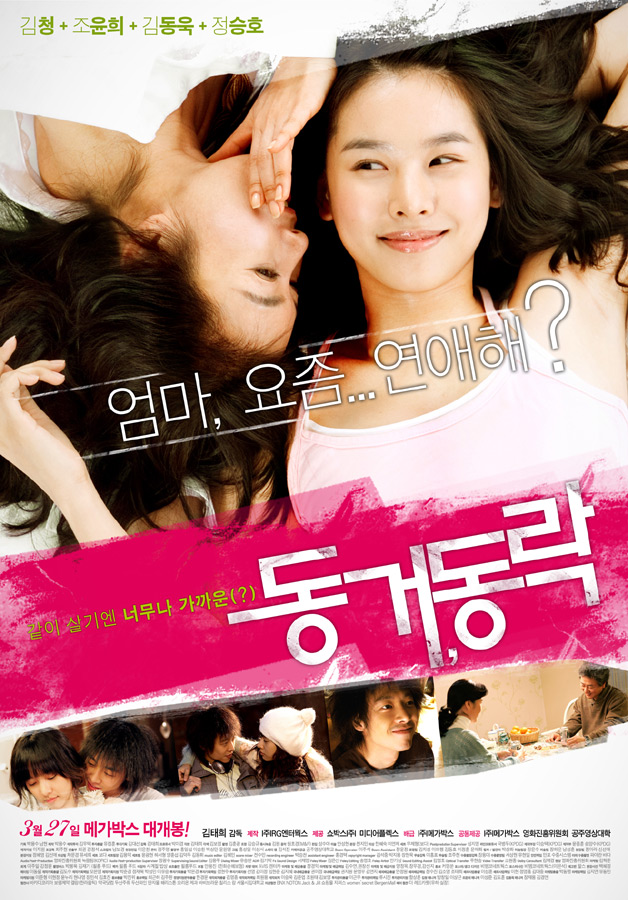 ( Live Together, 2007. Source )
( Live Together, 2007. Source )
Much to my regret later, I never properly met any Koreans in New Zealand before I first came here.
But by coincidence, a Korean woman replaced me in my last flat after I left. And as my ex-flatmates soon gleefully reported, she was the perfect flatmate, paying her share of the rent without ever actually spending so much as a single night there.
Glee rapidly turned to genuine concern though, as she completely disappeared a week after moving her stuff in, not answering her cell-phone at all for 2 weeks.
Alas, once she was back from her trip home(!), she explained she was actually living with her Korean boyfriend at his place. But, lest she be caught with him by her parents back in Korea somehow, she needed a separate address and home phone number, and a pretend bedroom just in case they made a surprise visit.
And once they were in the loop, then naturally that was fine with her flatmates, and she would end up spending less than, say, 4-5 hours a week there for the next 6 months.
 ( Source )
( Source )
Of course, I’m sure she had good reasons for what she did. And even 10 years later, openly cohabiting is a big taboo in Korea, testament to which is the fact Korean portal sites like Naver require age verification for you to search for anything related to donggeo, “동거”, the Korean word for cohabitation, placing it on a par with pornography and so on.
Granted, along with pregnancy, couples are generally forgiven if they have already made arrangements to marry, or at least do so shortly after being discovered. But as a Seoul-based friend who wrote his MA thesis on them frequently lamented, that means it can be near impossible just to find cohabiting couples, let alone ones willing to talk about their experiences with a researcher.
Still, that’s not to say that they don’t exist, and fortunately amorous Yonsei University couples at least don’t seem to need to go to quite such extremes to hide their living arrangements, as the third of four articles on the “Sex and the University” theme from the Yonsei Chunchu (연세춘추) campus newspaper explains. Not really giving any background on the subject though, if you haven’t already then I recommend reading this short introductory article I wrote for the Korea Times before starting here, and it also has a list of links to many other related posts for anyone further interested.
Update: Strangely, the internet searches work fine if you add an extra term, and hence there’s unrestricted access to info about the 2007 movie Live Together (donggeo-donglak; 동거동락) in the opening image for instance, which sounds great to watch with your partner on a cold winter night and a bed not far away interesting. Anybody seen it already? It’s also known as Happy Together, and yes, that is indeed a dildo mosaiced out at 0:42.
And without any further ado, thanks again to Marilyn for translating the article:
지금 사랑하는 사람과 살고 있나요? Are you living with the person you love?
원주캠, 신촌캠, 신림동 고시촌…요즘 젊은 세대들의 동거문화를 엿보다
Wonju campus, Shinchon campus, Sillim-dong gosichon [area where there are many people studying for Civil Service or other exams] – a look at the young generation’s cohabitation culture
『개인의 취향』, 『풀하우스』, 『옥탑방 고양이』….
모두 미혼남녀의 동거를 소재로 한 드라마들이다. 이런 드라마들은 동거생활의 알콩달콩한 면면을 보여주며 화제를 불러일으켰다. 미디어의 영향일까. 동거를 바라보는 대학생들의 시선은 관대한 편이다. 실제로 성의식 설문에 응답한 우리대학교 학생 중 43.6%가 “동거를 할 의향이 있는가”를 묻는 문항에 “그렇다”고 답했다. 그러나 동거에 대해 긍정적으로 생각한다는 것과 진짜 동거를 하는 것은 다른 법. 직접 학생들을 만나 실제 대학생들의 동거생활과 이에 대한 인식을 들어봤다.
Personal Preference, Full House, Attic Cat – all dramas about unmarried men and women cohabiting. These dramas have caused a stir by portraying the cute side of cohabitation. Does the media have influence [on us]? University students’ views on cohabiting are on the tolerant side. When asked, “Are you interested in cohabiting with a partner?”, 43.6% of students at our university who participated in a survey about attitudes toward sexuality said “yes.” However, there is a difference between having positive views of cohabitation and actually cohabiting. We met students and heard about real students’ experiences and perception of cohabitation.
 ( Source )
( Source )
매지리 동거족, 말하지 않아도 알아요
Cohabitation in Maejiri, known about even though they don’t talk about it
우리대학교 원주캠퍼스의 경우 학생 대부분이 타지방생이다. 그래서 통학생은 거의 없고 대부분 기숙사에 살거나 인근 지역인 ‘매지리’에서 자취한다. 상황이 이렇다보니 매지리에는 동거에 관해 다소 관대한 분위기가 형성돼 있다. 동거 사실을 공공연히 밝힐 정도는 아니지만 동거족이 많은 것은 알 사람들은 아는 사실이다. 실제로 매지리의 한 아파트에서 남자친구와 살고 있는 전아무개(23)씨는 친구들에게는 굳이 동거 사실을 숨기지 않는다고 말했다. 매지리에서 동거는 크게 문제시되는 사안이 아니기 때문이다. 그녀가 살고 있는 아파트에서 만난 김아무개(24) 커플은 완전한 동거 형태는 아니었지만 ‘거의’ 함께 살고 있다. 김씨는 기숙사생이지만 남자친구의 방에서 지내며 기숙사에는 거의 들어가지 않는다. 매지학사의 경우 기숙사비가 비싸지 않은 데다 집으로부터 의심을 피할 수 있기 때문에 들어가 살지 않더라도 일단 신청해두는 것이다. 김씨는 “이런 원주캠퍼스의 특징이 비교적 자유로운 동거 생활이 가능한 분위기를 조성하는 것 같다”고 말했다.
Most of the students at our university’s Wonju campus are from other areas. There are almost no students who commute from home, and most live in a dormitory or live independently in ’Maejiri’, a neighboring area. Because of that, an atmosphere of tolerance toward cohabitation has developed in Maejiri. It’s not to the point where people publicly reveal their cohabitation, but it is an open secret that many people are doing it. One Ms. Jeon (23), who actually lives in an apartment complex in Maejiri with her boyfriend, says that she doesn’t feel the need to hide the truth from her friends. She says it’s because in Maejiri living together is not a very problematic issue. In the same apartment complex, a Ms. Kim (24) and her partner are not quite in a cohabitation situation but are “almost” living together. Ms. Kim lives in a dormitory, but stays at her boyfriend’s place and hardly ever goes to the dorm. In the case of the Maeji school, a place where the dormitory fee is not expensive, students enter the dorm to avoid suspicion from home, so even though they don’t live there, it’s important to apply. Ms. Kim said, “One special feature of the Wonju campus is that it seems to create an atmosphere in which comparatively free cohabitation is possible.”
 ( Source )
( Source )
존재하지만 눈치 보이는 신촌
Sinchon, where it occurs but they care about others’ opinions
그렇다면 신촌캠퍼스의 상황은 어떠할까. 우리대학교 뿐 아니라 인근에 여러 대학이 밀집해있는 신촌의 경우 대학생들의 수 자체가 클 뿐 아니라 대학 간 커플도 종종 보인다. 그러나 동거를 대하는 학생들의 태도는 앞서 살펴본 매지리와는 사뭇 다르다. 신촌의 동거 커플들은 동거를 한다는 사실에 대해서는 크게 심각하게 받아들이지 않았다. 그러나 상대적으로 매지리에 비해 타인의 시선을 의식하고 있었다. 이아무개(22)씨는 여자친구와의 동거를 진지하게 고민해봤다고 했다. 그러나 그는 동거를 좋지 않게 보는 사람들의 시선이 신경 쓰여 망설이다 결국 단념했다. 지방에서 올라온 김아무개씨(21)는 그와는 조금 다른 경우로, 현재 신촌에서 여자친구와 함께 살고 있다. 김씨는 “처음엔 혼자 살았는데 어느 때부터 여자친구가 놀러오는 빈도가 잦아졌고 얼마 안가 동거를 제안하게 됐다”고 말했다. 그러나 둘 다 집에는 전혀 알리지 않았고 그것이 반드시 필요한 절차라고는 생각지 않는다고 했다.
So then how is it done in Sinchon? In Sinchon, where not only our university but several others are clustered, not only is there a large number of students, but also couples who go to university are often visible. However, the students’ attitude towards cohabitation is quite different than that seen in Maejiri above. Sinchon’s cohabitating couples don’t take living together very seriously. Compared to Maejiri, though, they were more conscious of others’ views. One Mr. Lee (22) has seriously considered cohabiting with his girlfriend. But because some of the people whose views he cares about think that cohabitation is not good, the plans fell apart and he finally gave up. A Mr. Kim (21), who came from outside of Seoul, was in a slightly different situation; he is currently living with his girlfriend in Sinchon. He said, “At first I lived alone but at some point my girlfriend started coming over a lot and not much later I asked her to move in with me.” However, he said the two have certainly not told their families, and he doesn’t think that it’s absolutely necessary to do so.
 ( Source )
( Source )
장래 약속한 동거커플 많은 신림동
Sillim-dong, where there are many cohabitating couples who’ve made promises for the future [about marriage]
신림동 고시촌은 함께 살며 고시를 준비하는 동거족들이 많은 지역이다. 이진아(25)씨는 자신의 고시촌 입주 당시를 회상하며 “큰 문화적 충격에 휩싸였었다”고 말했다. 동거하고 있는 커플들이 생각보다 너무 많았기 때문이었다. 주위 몇 집만 둘러봐도 동거 중인 커플들을 쉽게 볼 수 있다는 것이다. 이씨는 “공부에 전념하느라 연애할 여력이 없을 것 같은데 의외의 현상이었다”고 말했다. 또 다른 고시촌 거주 고시생인 김지영(28)씨도 비슷한 얘기를 전했다. 김씨는 “결혼을 약속한 남자친구와 함께 살며 공부하는 친구가 있다”며 “고시공부로 인한 외로움을 달래고 경제적인 부담도 줄이려는 것”이라 말했다. 김씨는 “같이 고시를 준비하는 고시촌 동거 커플들은 특히 장래를 약속한 사이가 많은 것 같다”고 덧붙였다.
The Sillim-dong gosichon is an area where there are many people cohabiting while preparing for major exams. While recalling moving into the gosichon, Lee Jin Ah (25) said, “It was a big cultural shock.” It was because there were many more cohabiting couples than she had thought. It’s that looking around at just a few of the nearby houses, she can find many cohabiting couples. Ms. Lee said, “It seemed like they would be too busy studying to have energy for romantic relationships so it was an unexpected situation.” At another gosichon residence, Kim Ji Young (28), who is preparing for an exam, also had a similar story. She said, “I have friends who are studying while living with boyfriends they have promised to marry,” and “It soothes the loneliness caused by studying for a major exam, and lessens the financial burden too.” She added, “It seems that many of the couples cohabiting in the gosichon and preparing for a major exam together have made special promises about the future to each other [are engaged].”
 ( Source )
( Source )
Filed under: Korean Demographics, Korean Education, Korean Sexuality, Sexual Relationships Tagged: 동거, 동거동락, 동거하다, 연세대학교, 연세춘추, Yonsei Chunchu, Yonsei University
Seoul Trip: The DMZ and North Korea
Seoul Trip: The DMZ and North Korea from Jamie Lomazzi on Vimeo.
The Year in Review: Is Lee Myung-Bak the President of the Year?
South Korea Has Accumulated Impressive Gains During 2010
As native Koreans would be glad to share with foreigners, Korea is far from perfect. Nevertheless, the branches of government have navigated exceptionally difficult conditions very well during 2010.
Here is a partial list:
a. Korea's economic growth was the greatest amongst OECD members during the 2nd Quarter 2010.
b. Korea's official unemployment rate has steady at a low 3.7%.
c. Foreign exchange reserves, the world's sixth largest, are near an all-time high at $290.23 Billion.
Circumstances Have Favored South Korea
Many of the positive things that have happened to the Korean economy are the result of circumstances alone. Here is a partial list of those circumstances which has benefited Korea.
a. Governments around the world have stimulated their economies which has resulted in continued economic demand for Korean-made products.
b. The strength of the Japanese Yen has made Korean-made products cheaper, which has greatly helped Korean corporations (chaebol).
c. China, the world's most populous nation, has continued its torrid economic growth.
It has been a nearly-ideal situation for Korea: its largest trade partners are relentlessly attempting to avoid Japan-like deflation by continually stimulating their economies with monetary and fiscal measures. Korea's largest potential market, China, continues to grow unabated as the Chinese government is trying to develop China into a modern economy. Japan, the nation with the majority of direct competitors to Korean corporations, are saddled with sagging domestic demand and a currency which has made their products expensive relative to Korea's in international markets.
The South Korean Government Has Acted to Strengthen Its Hand
While it may be suggested that South Korean President Lee Myung-Bak has merely been in the right place at the right time, there is little doubt that the President Lee and other governmental agencies have taken steps to provide for Korea's citizens, as well as to improve Korea's stature on the world stage.
a. Korea has only gradually reduced its fiscal stimulus programs because it has remained cautious regarding the sustainability of the global economic recovery.
b. Korea and the U.S., finally, have agreed on a Free Trade Agreement, which should improve the quality of life in Korea, and reduce inflation for Koreans.
c. The Bank of Korea has acted to keep the Korean Won relatively cheap in order to keep its export growth strong. While this has longer-term risks, this has helped Korean corporations in the short run.
d. Korea's emergence on the international stage was made obvious by its hosting of the G20 Seoul Summit in November. Even if you do no believe that much was accomplished, the fact that the meeting was hosted in Korea demonstrates its continuing importance on the world stage.
Korea Still Faces Fundamental Challenges
While Korea has enjoyed, as a nation, economic conditions which are superior to almost all other OECD nations, fundamental problems exist which cannot be solved overnight. In addition, only dramatic policy changes would have any effect, and the side-effects may be undesirable to many. Here are just a few lingering issues. Each issue itself is worth a post, which you will be able to find here at www.seoulgyopoguide.com in the future.
a. The value of real estate continues to disappoint owners. The value of real estate has actually declined in Seoul over the past two years, whereas in Hong Kong and Tokyo, prices have entirely recovered (Hong Kong) or are still recovering. This is not occurring in Korea. That is a problem because people's belief about their wealth is tied to the value of their homes. Real estate represents a greater percentage of a Korean's net worth than most other countries in the OECD. One reason the Bank of Korea is reluctant to increase interest rates? Increased interest rates leads to lower real estate prices, something that could lead to less consumer spending in Korea.
b. The increasing average age of the Korean population may weigh on social programs. Many Koreans do not believe that the Korean National Pension Service will be able to help those who currently work, when they retire. Assuming that Koreans want the Korean Pension Service to survive, the choices seem to be either higher taxes, or lower entitlements. Fundamental changes to the structure of the Korean pension system may be more feasible in Korea when compared to the U.S., where the system has been in place for a much longer period of time.
c. Underployment will continue to be a problem, as has been posted here. The bottom line is that Korea is over-educated, given the number of skilled workers needed in a nation of only 50mm. Comparisons among Korean workers are drawn using increasingly irrelevent criteria. How to resolve this will be the topic of a decades-long debate.
d. The private tutor (hagwon) system threatens the Korean family and the Korean economy. It isn't the goal of this article to discuss whether or not Korean students should study so hard, or if Korean parents should attempt to send their children to multiple hagwons per day. What is clear, however, is that the average Korean family spends too much of its disposable income on the private tutor system in Korea. That means less consumer spending and increased stress on the Korean family.
For those that have studied economics, a dollar spent on the hagwon system does not have the same multiplier effect on the Korean economy that other consumer spending has. For example, if a student spends $200 a month on a hagwon, that money is used to pay the rent and the teacher of the hagwon. However, that same $200, if spent on a consumer good, such as food, then the entire support system (e.g. a restaurant, its workers, the farmers of ingredients, etc) is far larger. In short, the money used in hagwons has a definite "dead end" to where the money goes. Money used elsewhere, The Lost Seoul contends, would have a greater, wider economic impact.
The hagwon system has been criticized for encouraging a greater separation among people of different economic classes. The government has publicly raised this concern. Recent attempts to try to standardize the questions for the college entrance exam in Korea have been widely (and justifiably) criticized due to the lack of thorough planning and poor execution of implementing the new system. However, the fact that the government is attempting to do so is a step in the right direction. Hopefully, these types of measures will be ultimately successful.
d. Inflation. Currently, inflation is much higher than is being reported in governmental figures. Everyday Koreans will tell you this. Being energy and resource poor, Korea will be face increasing inflationary pressure as a result of the demand for resources because China's demand will not fade. Currently, the Lee administration has acted in some way to accelerate Free Trade Agreements. However, as long as the Korean Won is held lower than is justified on international markets, import prices in Korea will remain very high, contributing to higher inflation.
Conclusion: Korea Needs the Next Generation of Leaders
Korea is resembling the United States more everyday: complaining about the government has become a national hobby. At some level, the government has failed for one reason or another. However, when compared to its counterparts in other nations, the Lee Administration has performed admirably. The question now is how to solve the longer-term problems, without upsetting the delicate balance that currently exists. In order for the younger generation of Koreans to take the reins, careers in government and public service must be more prestigious and frankly, better compensated. It is no coincidence that another widely-commended Asian government, Singapore's, attracts some of the brightest from the best universities in Singapore. Singaporean officials are among the most well-compensated officials in the world. Korea must cultivate those in their 30s and 40s to prepare to become the policymakers for the future. If Korea can do this, then it can solidify the hard-won gains since the end of the Korean War.
While President Lee's early years were difficult due to the global financial crisis, the fact is that Korea, and President Lee has deftly dealt with the situation. It can be said that Korea's position in the world economic order has improved quite a great deal since the onset of the crisis. As stated above, some of that is the result of favorable circumstances. Nevertheless, it is a fact that when things go well, the leader is given a great deal of the credit. In this case, President Lee and the Korean government deserve many of those accolades.
Kaplan on the Middle Asian Lake
I can’t say I’ve always loved what Robert D, Kaplan has written, but I did enjoy what he says in this “Tea with Robert Kaplan” video (sorry, the video uploaded a bit oddly). I’m a bit skeptical about Beijing’s peaceful rise, though. Yet, I heartily agree that the key to American competitiveness in the region is to eschew territorial entanglements,
Here’s a link to Kaplan’s Monsoon. The video, though, is a much more compelling ad than this sensationalistic crap on the site.
Filed under: Academia, Books, East Asia, LF-Recommended, Military, Politics, South Asia, Subscriptions, USA Tagged: china, india, indian ocean, monsoon, robert d kaplan, the economist, us navy
They Shoot Horses, Don't They?
The trip to the hospital got off to a worrying start after discovering an ambulance parked at the entrance bearing the legend “Pusan Mental Hospital”. Just the day before, I'd read about a new law that allegedly enabled the Government to detain foreigners without trial on mental health grounds, in an article which ended with the words of a Korean wife saying "Now I can trick my non-Korean speaking husband into attending the hospital on some pretext, explain some of his habits to the doctors, and get rid of him." Worrying.
Given that the article is a satire, or at least I hope it is because the original news story leaves some room for doubt, I took this as proof that my life may now finally be approaching the point of maximum absurdity it's possible to reach as a private citizen without becoming a government employee. Five minutes later we were filling in the psyche questionnaire.
How many times a week do I get depressed? How many times a week am I sad? Why does the answer scale only go up to four? “Looks like you might be going to see a psychiatrist” quips my wife as she ticks several numerically high boxes. Thanks. Helpful. I don't know, isn't this normal for a foreigner living in Korea? Well, maybe it isn't, but I have no reference point. But I didn't get referred to a psychiatrist, so maybe it is. Or maybe they don't care, I certainly don't – that's the advantage of feeling down that all those happy people don't want to talk about.
So do I want to have a camera stuck down my throat? No... why would I? Honestly, I know network television in South Korea is so apparently awful that even the North Koreans find it stereotypical these days, but what lengths will medical staff go to just to entertain themselves in front of a TV? The procedure requires me to be heavily sedated or unconscious anyway, and I weigh up the obvious advantages of this versus the inherent risks and decide against it. I'll do it when I actually think I have a problem I thought, slipping into exactly the kind of sociological conditioning the British National Health Service works so hard to cultivate. “Yes,” says the nurse detecting my internal dialogue, “I can see that while you're physically ready for it, you're not mentally ready for it”. I don't even know what that means. What does that mean?
Now comes the really hard sell. So my blood is going be tested for thirteen different problems. Would I like to pay extra and be tested for seventy problems instead? It's only 30,000 won extra. This is how it begins. You can even pay extra to receive a forecast for future medical problems based on a range of additional tests, questionnaires and the hospital computer's random number generator. Or you can visit a fortune teller, because it might be cheaper. Buy into enough extra tests and the one problem they are guaranteed to detect is that you are haemorrhaging money. But I paid for the extra blood tests, because I'm intrigued to know the answer to test number 67 – 'percentage of banana concentrate in blood'.
An x-ray to top-up my Korean half-life, an ultrasound to see if I'm still generally sound, an ECG to test my short-circuits, and we're done. As we walk up the stairs from the dungeon of devices, I reflect on the fact that I'm clearly in much better shape than the hospital building, which is six months old and features an alarmingly large crack running down its side.
When we leave they forget to ask us to pay, resulting in two nurses chasing after us outside the building. Perhaps their unwillingness to wait a few days for my return appointment may not bode well for the test results after all.
Busanmike.blogspot.com
Twitter: @BusanMike
YouTube: /BusanMikeVideo
Flickr: /busanmike
High Entertainment, Low Cost- Korean Pro Basketball
Functional Breakfasts
- Green tea containing epigallocatechin gallate (antioxidant)
- Blueberry extract containing anthocyanins (anticancer)
- Dessicated Lactobacillus, a probiotic that balances digestion (like Yakult)
- Omega 3, for lower risk of cardiovascular disease




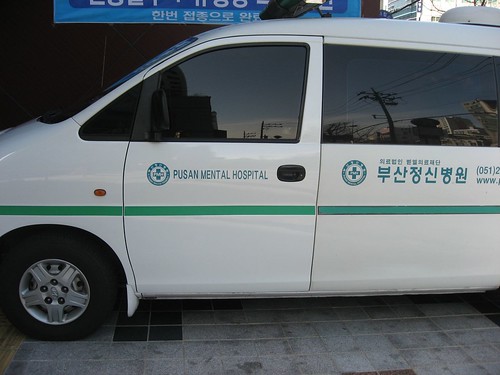

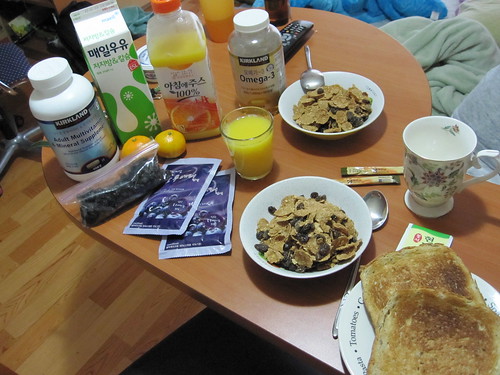
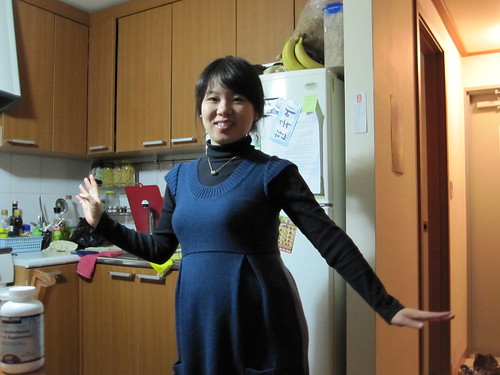

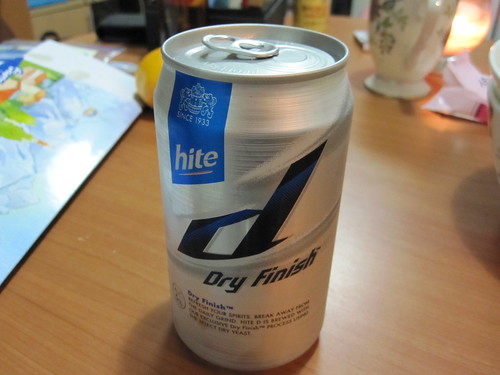
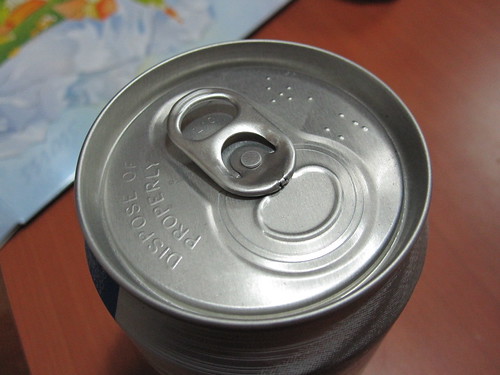
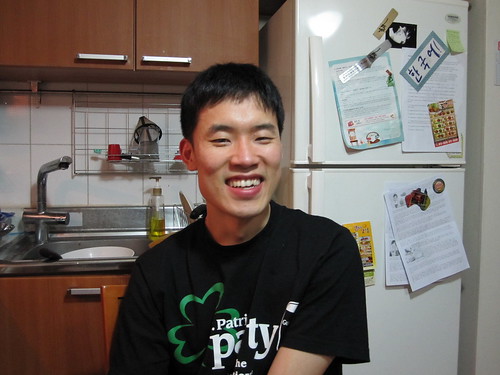
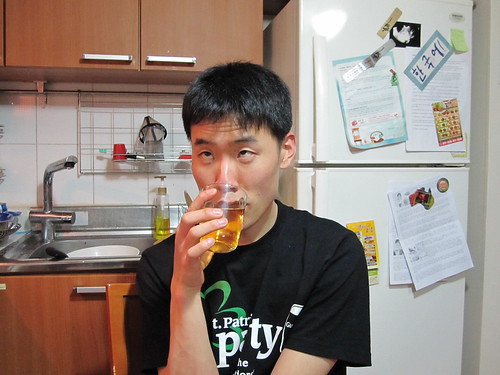
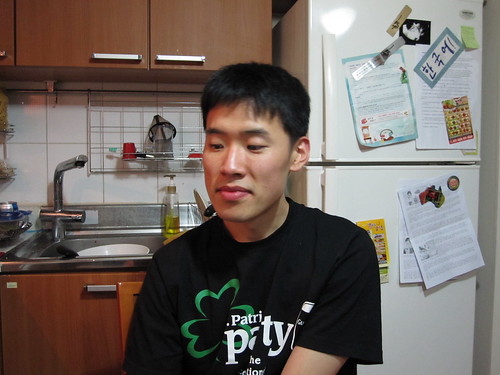

Recent comments